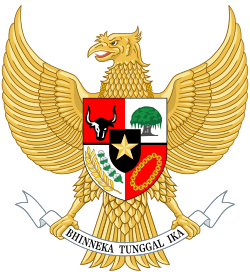Ministry of Foreign Affairs (Indonesia)
The Ministry of Foreign Affairs of the Republic of Indonesia (MoFA), commonly referred to as the Foreign Affairs Ministry (Indonesian: Kementerian Luar Negeri Republik Indonesia abbreviated "Kemlu"), is a government ministry responsible for the country's foreign politics and diplomacy. The ministry was formerly known as the Department of Foreign Affairs (Departemen Luar Negeri Republik Indonesia, better known as Deplu). The name changed due to the new law about State Ministry of 2008 (UU 39/2008).
| Kementerian Luar Negeri | |
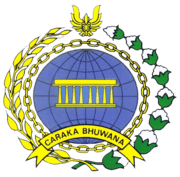 | |
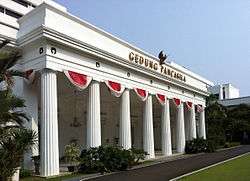 Gedung Pancasila, part of the Ministry of Foreign Affairs' building complex. | |
| Ministry overview | |
|---|---|
| Formed | August 19, 1945 |
| Jurisdiction | Government of Indonesia |
| Headquarters | Pancasila Building Central Jakarta, Jakarta CSR, Indonesia |
| Employees | 3,349 Civil Service employees[1] |
| Annual budget | $549.2 million (FY 2019) [2] |
| Ministry executives |
|
| Website | www |
Ministry of Foreign Affairs is one of the ministries (along with Ministry of Defense and Ministry Home Affairs) that is mentioned in the Constitution of Indonesia, so the president has no authority to dissolve this ministry, compared to other ministries that are not mentioned in the Constitution of Indonesia.
In the case that both of the president and the vice president can no longer serve at the same time, the line of succession falls to the minister of foreign affairs, minister of home affairs and minister of defence concurrently until the succeeding President and Vice President are elected by the People's Consultative Assembly within thirty days.[3]
Since October 2014, Retno Marsudi has served as Foreign Minister, succeeding Marty Natalegawa.
History
The Ministry of Foreign Affairs was founded in 1945 following the Proclamation of Indonesian Independence from the Netherlands.[4] The headquarters was initially located in the garage of the country's first Foreign Minister, Achmad Soebardjo, at Jl. Cikini 80–82 in Jakarta.[4] The Ministry started with just six employees, including Hadi Thayeb.[4]
Duties and responsibilities
The Ministry of Foreign Affairs (also known as the Department of Foreign Affairs) have statutory responsibilities for Indonesian foreign policy. The head of the Ministry of Foreign Affairs, the Minister of Foreign Affairs, is the President's principal foreign policy advisor. The Ministry advances Indonesian objectives and interests in the world through its primary role in developing and implementing the President's foreign policy. It also provides important services to Indonesian citizens and to foreigners seeking to visit Indonesia. All activities—bilateral programs, consular affairs, Indonesian representation abroad—are paid for by the budget, which represents a little more than 0.30% of the total government budget. As stated by the 56th Republic of Indonesia Presidential Regulation concerning the Ministry of Foreign Affairs,[5] its purpose includes:
- Formulation and policy-making in the field organizing foreign relations and policy.
- Implementation of policies in the field organizing foreign relations and policy.
- Implementation of technical guidance and the supervision of the implementation of policies in the field organizing foreign relations and policy.
- Implementation, assessment, and development in the field organizing foreign relations and policy.
- Implementation of substantive support to all organizational elements within the Ministry of Foreign Affairs and Representatives of the Republic of Indonesia.
- Developing and providing administrative support at the scope of the Ministry of Foreign Affairs and Representatives of the Republic of Indonesia;
- Implementation of education and training in the field of foreign affairs.
- Management of public property/assets that is the responsibility of the Ministry of Foreign Affairs and Representatives of the Republic of Indonesia.
- Supervision of the execution of duties at the Ministry of Foreign Affairs and Representatives of the Republic of Indonesia.
Organizational structure
Core activities
The MoFA advances Indonesian foreign policy by promoting (1) 'Maritime diplomacy and strong border'; (2) 'Advancing Indonesian leadership in ASEAN'; (3) 'Advancing Indonesian role in the international community'; (4) 'Stronger economic diplomacy'; (5) 'Prime service and protection of Indonesian citizens (Warga Negara Indonesia), legal entities (Badan Hukum Indonesia), and Indonesian Diaspora'; (6) 'Enhanced foreign policy'; (7) 'Significant national support and commitment for foreign policy and international agreements'; and (8) 'Monitoring efficient diplomatic results.'[6]
Minister of Foreign Affairs
The Minister of Foreign Affairs is the head of the Ministry of Foreign Affairs and a member of the Cabinet that answers directly to, and advises, the President of the Republic of Indonesia. The minister organizes and supervises the entire department and its staff.[7]
Staff
The Ministry of Foreign Affairs has 3,349 Civil Service employees[8]
- Office of the Deputy Minister for Foreign Affairs: The Deputy Minister assists the Minister, leading in the organizing of the ministry.
- Secretariat General
- Directorate General of Asia Pacific and Africa
- Directorate General of America and Europe
- Directorate General of ASEAN Partnership
- Directorate General of Multilateral Partnership
- Directorate General of Law and International Treaty
- Directorate General of Information and Public Diplomacy
- Directorate General of Protocol and Consular Affairs
- Inspectorate General
- Policy Assessment and Development Agency
- Special Advisor to the Minister on Economic Diplomacy
- Special Advisor to the Minister on Socio-Cultural Affairs and Indonesian Diaspora Empowerement
- Special Advisor to the Minister on Interagency Relations
- Special Advisor to the Minister on Management Affairs
- Special Advisor to the Minister on Strategic Affairs
- Special Advisor to the Minister on Priority Programs Strengthening
Tasks and duties
The tasks and duties of Ministry of Foreign Affairs is different from time to time, is as follows:
1945–50
Their main duties through the aid of diplomacy were:
- Making every effort to gain sympathy and support from international community, building solidarity from partners of various fields through any effort to gain support and acknowledgement upon Indonesia's independence
- Conducting conferences and making agreements on:
- 1947 – Linggarjati Agreement – acknowledgement upon the Republic of Indonesia, which covered Java and Madura
- 1948 – Renville Agreement – acknowledgement upon the Republic of Indonesia, which covered Java and Sumatera
- 1949 – Round Table Conference – Indonesia was in the form of Federal State
- 1950 Indonesia’s diplomacy has restored the unity of all the regions in the republic of Indonesia by revoking the Round Table Conference.
The first five-year period of Indonesia's independence was a period which decided the struggle to maintain the independence which was a part of the history to decide the character or the nature of Indonesia's foreign policy.
The spirit of Struggle Diplomacy has made Indonesia attain support from international community of the United Nations in the year 1950.
1966–98
The prominent duties were:
- The acknowledgement of West Irian
- The acknowledgement of Indonesia as an archipelagic country as the result of the struggle of the law of the sea – UNCLOS (United Nation Convention on Law of the Sea)
- The development of ASEAN Cooperation
- Making the effort of gaining international acknowledgement on East Timor
- Being the chairman to Non-Aligned Movement to struggle for the sake of developing countries
- Being the chairman to APEC and G-15
- Improving the co-operation of development
1998–present
The main duties are to:
- Prevent nation disintegration potential
- Attempt to help economic recovery
- Attempt to improve the image of Indonesia
- Improve the quality of serving and protecting the citizens of Indonesia
List of ministers
| # | Portrait | Minister | Term Start | Term End |
|---|---|---|---|---|
| 1 | 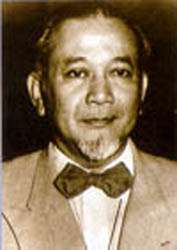 |
Achmad Soebardjo | ||
| 2 | 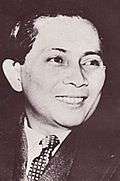 |
Sutan Sjahrir | ||
| 3 |  |
Agus Salim | ||
| — | 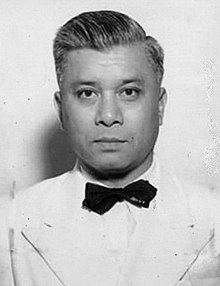 |
Alexander Andries Maramis | ||
| (3) |  |
Agus Salim | ||
| — | 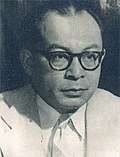 |
Mohammad Hatta | ||
| 4 |  |
Mohammad Roem | ||
| (1) |  |
Achmad Soebardjo | ||
| 5 | 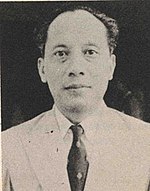 |
Wilopo | ||
| 6 | Moekarto Notowidigdo | |||
| 7 | Soenario | |||
| 8 | 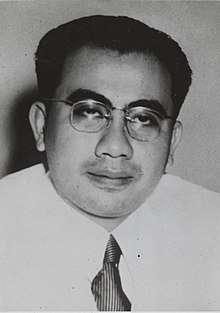 |
Ida Anak Agung Gde Agung | ||
| 9 |  |
Ruslan Abdulgani | ||
| 10 |  |
Subandrio | ||
| 11 | 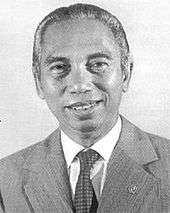 |
Adam Malik | ||
| — | Syarif Thayeb (acting) | |||
| 12 | .jpg) |
Mochtar Kusumaatmadja | ||
| 13 | 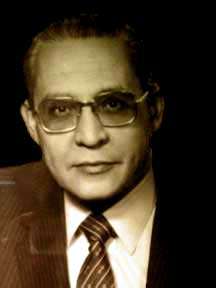 |
Ali Alatas | ||
| 14 |  |
Alwi Shihab | ||
| 15 | 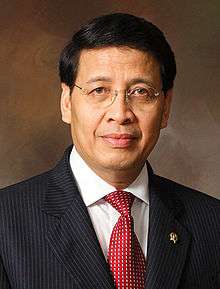 |
Hassan Wirajuda | ||
| 16 |  |
Marty Natalegawa | ||
| 17 | _(cropped).jpg) |
Retno Marsudi |
See also
Literature
- Nabbs-Keller, Greta (April 2013). "Reforming Indonesia's Foreign Ministry: Ideas, Organization and Leadership". Contemporary Southeast Asia. 35 (1): 56–82.
References
- "Diplomasi 101 Ep 1: Kementerian Luar Negeri". Retrieved 22 June 2020.
- "Komisi I Setujui Pagu Anggaran Kemenlu RP 7,8 T Tahun Depan". Retrieved 5 May 2019.
- Constitution of Indonesia, article 8 paragraph 3
- "Senior diplomat Thayeb dies at 91". Jakarta Post. 11 January 2013. Retrieved 1 March 2014.
- "Peraturan Presiden Republik Indonesia Nomor 56 Tahun 2015 Tentang Kementerian Luar Negeri" (PDF). Retrieved 5 May 2019.
- "Ministry of Foreign Affairs Strategic Goals". Retrieved 5 May 2019.
- "Peraturan Presiden Republik Indonesia Nomor 56 Tahun 2015 Tentang Kementerian Luar Negeri" (PDF). Retrieved 5 May 2019.
- "Diplomasi 101 Ep 1: Kementerian Luar Negeri". Retrieved 22 June 2020.
External links
- Ministry of Foreign Affairs (in English)
